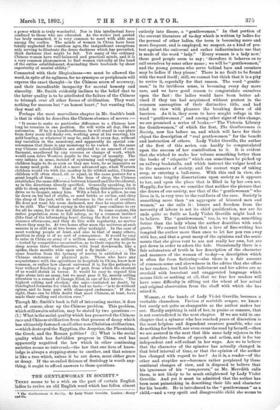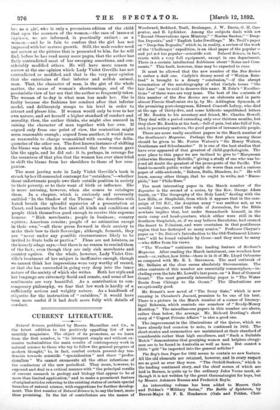THE GENTLEWOMAN IN SOCIETY.*
THERE seems to be a wish on the part of certain English ladies to revive an old English word which has fallen almost entirely into disuse, a "gentlewoman." In that portion of the current literature of to-day which is written by ladies for the perusal of other ladies, the term is becoming more and more frequent, and is employed, we suspect, as a kind of pro- test against the universal and rather indiscriminate use that is made of the word "lady." Every woman is a lady now,' these good people seem to say ; 'therefore it behoves us to call ourselves by some other name ; we will be "gentlewomen," and the young persons who serve behind bars and counters may be ladies if they please.' There is no fault to be found with the word itself; still, we cannot but think that it is a pity to revive it, especially for that reason. The word "gentle- man," in its invidious sense, is becoming every day more rare, and we have good reason to congratulate ourselves upon the fact : the ladies would have been better ad- vised if they too had acquiesced without protest in the common assumption of their distinctive title, and had tried to view with pleasure the breaking down of old barriers. As it is, they seem to have sought refuge in the word "gentlewoman ;" and among other signs of this change, we are promised a series of books,—" The Victoria Library for Gentlewomen," of which the first, The Gentlewoman in Society, now lies before us, and which will have for their object the description of "real gentlewomen" for the benefit and instruction of others. Lady Violet Greville, the author of the first of this series, can hardly be congratulated upon the success of her contribution to it. It is evident that she wished to make her volume Something better than the books of " etiquette " which can sometimes be picked up on railway bookstalls, and which instruct the vulgar herd as to the manners of society, and the correct ways of taking soup, or entering a ball-room. With this end in view, she enters into lengthy dissertations upon society as it appears to her, and upon the place that is filled in by her own sex. Happily, for her sex, we consider that neither the picture that she draws of our society, nor that of the " gentlewoman " who lives in it, is very true to the real facts of the case. Society is something more than "an aggregate of leisured men and women," as she calls it : leisure and freedom from the necessity of labour is not its chief qualification, nor are its ends quite so futile as Lady Violet Greville might lead us to believe. The "gentlewoman," too, is, we hope, something better than the lady whom the author describes with such gusto. We cannot but think that a love of fine-writing has tempted the author more than once to let her pen ran away with her, and that a great many of the opinions and the senti- ments that she gives vent to are not really her own, but are put down in order to adorn the tale. Occasionally there is a fair substratum of truth in her description of the character and manners of the woman of to-day—a description which is often far from flattering—also there is a fair amount of common-sense and shrewdness in the advice that she offers to her readers ; but both her indictment and her advice are so overlaid with luxuriant and exaggerated language which means little or nothing at all, that we fear her readers will have some difficulty in sifting out the wheat of her actual and original observation from the chaff with which she has mixed it.
Woman, at the hands of Lady Violet Greville, becomes a veritable chameleon. Varium et mulabile semper, we know ; but surely not quite so changeable as the author makes her out. Hardly anything is said of her, in praise or censure, that is not contradicted in the next chapter. If we are told in one chapter that a spinster who has reached years of discretion is the most helpless and dependent creature possible, who can do nothing for herself, nor even cross the road by herself,—then we are assured in the next that this same lady rejoices in the most absolute freedom of speech and action, and is far too independent and self-reliant in her ways. Are we to believe that the character of the spinster has actually changed in that brief interval of time, or that the opinion of the author has changed with regard to her ? As it is, a reader—of the other and stupider sex—becomes rather perplexed by these continual changes of view, and is disposed to believe that his ignorance of his "conquerors," as Mr. Meredith calls them, is not likely to be much enlightened by Lady Violet Greville. And yet it must be admitted that the author has been most painstaking in describing their life and character for his benefit. He is introduced to the " gentlewoman " as a be : as a girl, wh3 is only a precocious edition of the child that apes the manners of the woman,—the race of innoceat ingonnes, we are informed, is practically extinct : as a worn in,—and he is fain to confess that the girl has not improved with her mature growth. Still, the male reader need not sorrow at the picture that is presented to him, for he will find, before he has read many more pages, that the author has flatly contradicted most of her sweeping assertions, and con- siderably modified others. He will have more reason to sorrow at the one opinion which Lady Violet Greville has not contradicted or modified, and that is the very poor opinion that she entertains of that inferior and selfish animal, man. That, the character of man, is the gist of the whole matter, the cause of woman's shortcomings, and of the pessimistic view of her sex that the author so frequently takes. The woman of to-day is what man has made her. She is faulty because she fashions her conduct after that inferior model, and deliberately stoops to his level in order to attract and please him. If woman would only be true to her own nature, and set herself a higher standard of conduct and morality, then, the author thinks, she might also succeed in raising the character of man together with her own. If argued only from one point of view, the contention might seem reasonable enough ; argued from another, it would seem as reasonable to charge womankind with causing the delin- quencies of the other sex. The first known instance of shifting the blame was when Adam answered that the woman gave him the apple, and he did eat : it is, perhaps, in revenge for the meanness of that plea that the woman has ever since tried to shift the blame from her shoulders to those of her com- panion.
The most jarring note in Lady Violet Greville's book is struck by her ill-concealed contempt for "outsiders,"—whether these unfortunate people owe their outside position in society to their poverty, or to their want of birth or influence. She is more amusing, however, when she comes to catalogue them. In a chapter, which is curiously and reverently entitled "In the Shadow of the Throne," she describes with bated breath the splendid mysteries of a presentation at Court, and laments the fact that all kinds and conditions of people think themselves good enough to receive this supreme honour. "Rich merchants ; people in business ; country squires ; American cousins ; people of no estimation except in their own,"—all these press forward in their anxiety to make their bow to their Sovereign ; although, forsooth, they are "never under any possible circumstances likely to be invited to State balls or parties." Fleas are not lobsters, as the homely adage says,—but there is no reason to remind them of the fact ; even though they are only rich merchants and country squires. On the whole, however, Lady Violet Gre- ville's treatment of her subject is inoffensive enough, though we cannot think her impressions were very worthy of record, or that she has succeeded in going very deep into the inner nature of the society of which she writes. Both her style and her language are extremely florid and ornate, and some of her sentiments are very beautiful. As a contribution to con- temporary philosophy, we fear that her work is hardly of a sufficiently serious and weighty nature. As a handbook of etiquette for the instruction of "outsiders," it would have been more useful if it had dealt more fully with details of conduct.



































 Previous page
Previous page